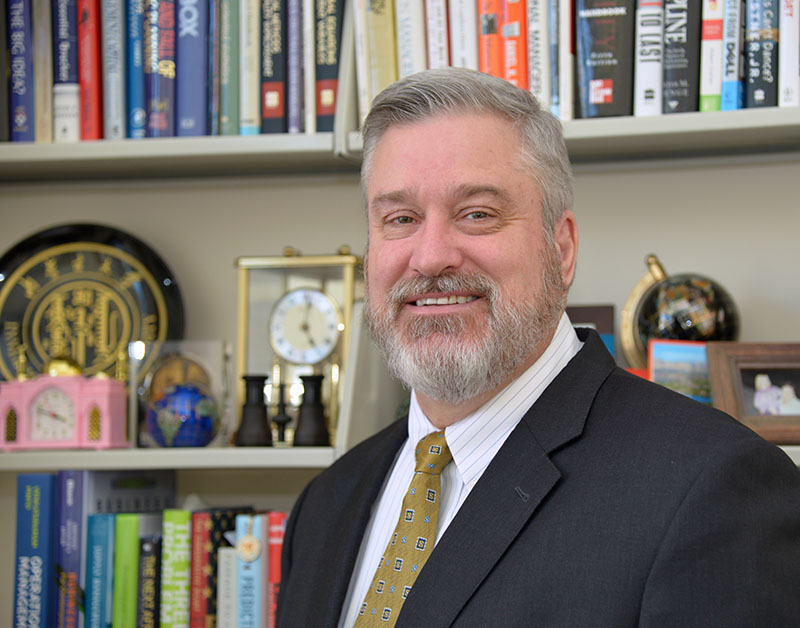
From the cornfields in Indiana to the ice floes of Antarctica, Dan Heiser’s passion for education and travel has coalesced into a new appointment at DePaul University. After serving as the interim chair of the
Department of Management & Entrepreneurship for the last year, Heiser received a three-year assignment to full chair. Heiser is celebrating his 20th year teaching at DePaul and is excited to bring his impressive educational background and passion for studying global engagement to the leadership of the management department.
Heiser studied economics at Wabash University in the Hoosier state and also earned both a doctorate in operations management and a law degree from Indiana University. He practiced law for 10 years and primarily held government positions before entering higher education at DePaul.
Heiser served as associate dean at DePaul’s Driehaus College of Business for six years, overseeing global partnerships, and also taught operations management, including courses that covered supply chains, project management, and quality control and improvement. His passion for international travel has steered Heiser to teach in at least 10 countries, and personally travel across the globe, even spending a few weeks earlier this year kayaking in Antarctica. In this Q&A, Heiser talks about how these experiences helped prepare him for his new role, and what’s in store for management education at DePaul.
Tell us about your research interests.
I mainly focus on supply chain research. As the U.S. economy has moved away from manufacturing, we have seen a lot of economic activity that now crosses national borders. There is a transnational flow of goods and services, which brings about a whole new set of issues including the rise of automation, the changing nature of the way work gets done and where the work is getting done. The challenge of combining a diverse workforce, emerging technologies and productive processes are the issues that really interest me.
What appeals to you about international education?
I grew up on a small farm in rural Indiana. Moving to a city like Chicago was such a cultural transition for me. I had students in my classroom coming from all different parts of the world sharing in the development of knowledge. It was an awakening and started me on my journey of recognizing how different cultures learn and work together.
What appeals to me about international education is exploring how higher education addresses the cultural context across the globe. For instance, mathematics is a universal language regardless of culture, religion or gender. But, it’s the context of an application of a mathematical model through people and processes of different cultures that may yield different results. People are influenced by where they happen to be standing on the planet whether it is the Middle East, Asia or the Americas. Much is lost in translation, and how we understand or misunderstand each other is enlightening.
I am also passionate about the DePaul Vincentian value of providing education to underserved populations in Chicago and our other locations around the world. Specifically, how can we build DePaul’s capacity to develop faculty members to prepare all our students to live in a borderless world economy.
What do you have planned for the department?
Higher education as whole is changing. The sands are shifting beneath our feet and there are whole new areas that need to be explored. Some of this has to do with technology and the role that data plays in our life. We need to be looking at collaborations outside the management department. Right now we are working on different projects with the Jarvis College of Computing and Digital Media to discover how we can marry not only technology and innovation, but also the skills we bring as managers. Entrepreneurship across the curriculum is another place where there is enormous potential for cross-college collaboration and cross-department collaboration. One of my goals is to have us looking outside and viewing these opportunities. Certainly they are challenges for the way we have done business in the past, but there are tremendous opportunity for growth.
Why is now a good time to study management at DePaul?
Relevancy—we want to make sure what we are teaching in the classroom applies to what our graduates will be experiencing out there in the real world. We have amazing faculty that bring experiential learning from the local community into the classroom. We are introducing new methodologies, offering more online classes, and giving our students more hands-on, applied activities. We want our students to recognize that as they proceed in their careers, they will be dealing with people from different cultures and socio-economic issues, and how we can find that commonality and work together to achieve our goals. We are dedicated to making our students career ready.
Learn more about DePaul's management major, the
DePaul MBA and
business master's programs.